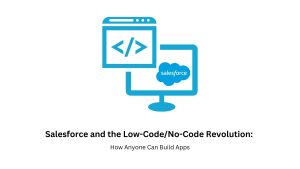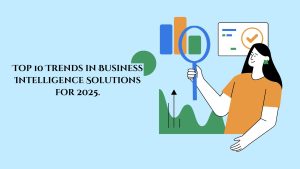
Salesforce and ERP Integration: Why It Matters for Growing Businesses.
In the dynamic landscape of modern business, maintaining a competitive edge goes beyond sheer effort—it hinges on efficiency, smooth collaboration, and real-time data accessibility. Salesforce, a top-tier customer relationship management (CRM) platform, excels in optimizing customer-focused operations. Meanwhile, enterprise resource planning (ERP) systems address the operational core of a business, handling resources, finances, supply chains, and other critical functions.
Integrating Salesforce with an ERP system creates a unified ecosystem where information flows effortlessly between departments, breaking down silos and enabling organizations to operate with unparalleled agility. Let’s dive deep into why Salesforce and ERP integration matters and how it brings transformative changes to businesses.
What is Salesforce and ERP Integration?
Salesforce and ERP integration connect the CRM system with the ERP system to ensure seamless data synchronization. This integration enables real-time updates between customer-facing teams (like sales and marketing) and back-office departments (like finance and supply chain).
Common ERP systems that integrate well with Salesforce include SAP, Oracle NetSuite, Microsoft Dynamics 365, and others.
Key Benefits of Salesforce and ERP Integration.
- Enhanced Data Accuracy
- Problem: Separate systems often result in duplicate or inconsistent data, causing errors in reporting and decision-making.
- Solution: Integration ensures real-time data synchronization, eliminating redundancy and improving data accuracy.
- Improved Customer Experience
- How: Sales teams gain instant access to inventory levels, order statuses, and delivery timelines directly in Salesforce.
- Impact: This enables them to provide quick and accurate updates to customers, improving satisfaction and loyalty
- Streamlined Workflows
- Integration Feature: Automating workflows between Salesforce and ERP reduces manual intervention.
- Example: When a salesperson closes a deal in Salesforce, the integration can automatically trigger an order creation in the ERP system.
- Better Financial Visibility
- Benefit: Finance teams can access sales forecasts, deal statuses, and revenue reports directly linked to ERP financial modules.
- Why It Matters: Why It Matters: This provides a clear picture of cash flow and profitability, aiding better financial planning.
- Faster Decision-Making
- How: Unified data provides a 360-degree view of business operations.
- Example: Managers can make informed decisions about production schedules, marketing budgets, or resource allocation based on synchronized data.
- Scalability for Growing Businesses
- Why Important: As businesses scale, managing separate systems becomes challenging. Integration offers a scalable solution, adapting to growth effortlessly.
The Business Impact: Real-World Applications.
1. Order Management Optimization
Integration allows orders placed in Salesforce to be processed directly in the ERP system, streamlining the fulfillment process.
2. Predictive Analytics
Combining Salesforce’s AI-driven insights with ERP data enhances predictive capabilities for inventory demand and customer behavior.
3. Efficient Resource Allocation
Real-time insights from ERP help sales teams plan more effectively, avoiding overpromising or underutilizing resources.
4. Cross-Functional Collaboration
Teams across departments—sales, marketing, finance, and operations—work with a single source of truth, fostering better collaboration.
Why the Future Depends on Salesforce?
1. Adaptability to Trends
Salesforce consistently evolves with market trends, incorporating AI, automation, and cloud capabilities. Businesses relying on Salesforce gain access to cutting-edge technologies that keep them competitive.
2. Customer-Centric Approach
As the global business landscape shifts towards customer-first strategies, Salesforce’s CRM capabilities become indispensable.
3. Future-Proof Integrations
The platform’s ability to integrate with ERP systems ensures businesses can leverage their existing infrastructure while embracing digital transformation.
4. Global Reach and Scalability
Salesforce supports businesses of all sizes, ensuring scalability for startups and enterprises alike.
How to Implement Salesforce and ERP Integration?
1. Assess Business Needs
Identify critical processes and pain points that require integration.
2. Choose the Right ERP System
Ensure compatibility between Salesforce and your ERP.
3. Opt for Middleware Solutions
Platforms like MuleSoft (owned by Salesforce) facilitate seamless integration.
4. Engage Experts
Partner with experienced consultants to ensure a smooth integration process.
5. Test and Train
Conduct extensive testing and provide training for end-users to maximize ROI.
Conclusion
Salesforce and ERP integration is more than just a technological upgrade; it’s a strategic investment for growing businesses. By aligning front-office and back-office operations, this integration enables organizations to operate efficiently, deliver exceptional customer experiences, and stay ahead of the competition.
As the business world continues to evolve, staying with the trend by leveraging Salesforce’s robust integration capabilities will ensure sustained growth and long-term success. With its customer-centric focus, adaptability, and seamless integrations, Salesforce isn’t just a tool—it’s the future of business efficiency.
Is your business ready to integrate Salesforce with your ERP system? Now is the time to embrace this transformation and unlock your company’s full potential.






No comment yet, add your voice below!